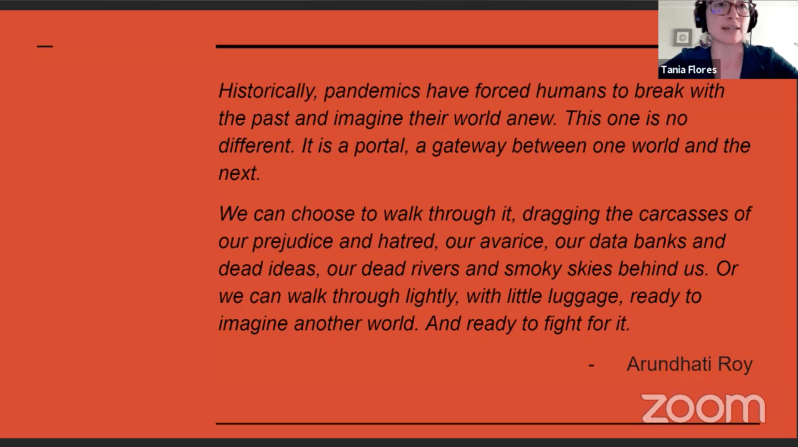A coalition of eight student groups asked administrators to respond to student demands and make Stanford a more “just and equitable institution” in a “reverse town hall” on Thursday afternoon.
Over 400 students, alumni and community members attended the presentation, which centered “A Roadmap to Reopening with Justice and Equity,” the coalition’s vision statement and outline of actionable demands for Stanford. Provost Persis Drell, vice provosts Susie Brubaker-Cole and Stacey Bent and interim Title IX coordinator Catherine Glaze were among the administrators and professional staff present.
“We recognize the interconnected nature of all of these pieces of our collective vision, and we know that our work will not and cannot be complete until the administration has agreed to implement each one of these demands,” Stanford Students for Workers Rights representative Arushi Gupta ’23 said during the event opening. “We do not lead single-issue lives, and all of these issues must be acted upon immediately by the University. As a coalition, we fight for each and every one of them, and speak in solidarity.”
The event consisted of eight presentations — one by each student organization represented — followed by an audience question and answer session in which administrators had an opportunity to respond directly to concerns. The coalition consisted of police abolition group Abolish Stanford, the Black Graduate Student Association (BGSA), the Graduate Student Council (GSC), Sexual Violence Free Stanford (SVFS), Stanford Basic Needs Coalition (BNC), Stanford Neighbor Accountability Coalition (SNAC), Stanford Solidarity Network (SSN) and Students for Workers’ Rights (SWR).
Abolish Stanford called for an end to the University’s contract with the Stanford University Department of Public Safety and asked the University to divert campus police funding to mental health resources. The group also asked for the release of police activity records and called for incoming students to be trained in policing alternatives as part of moving toward a non-punitive “model of peer education and bystander intervention,” according to third-year Ph.D. student in bioengineering Alexa Garcia.
SNAC representative and third-year Ph.D. student in cancer biology Yiran Liu called on Stanford to explicitly acknowledge that the University’s land belongs to the Muwekma Ohlone and to invest in affordable housing and transportation for the local community.
Black Graduate Student Association president Kimya Loder and vice president Reagan Ross, Ph.D. students in sociology and communication, respectively, called for departmentalization of African and African American Studies within the next five years and the prioritization of Black studies in allocating funding and hiring resources.
“The University implemented plans to promote the impact of racism in America as a solution without contacting Black student leaders or the African and African American Studies program,” Loder said. “How is it that the University can craft solutions to anti-Black racism affecting our intellectual and scholarly community without consulting the Black students and faculty calling for change?”
SWR representatives asked Stanford to prioritize the health and safety of its workers and issue pay continuance for laid-off subcontracted service workers. Service worker Inmar Liborio shared that in light of the increased risk and workload, he and other workers had petitioned UG2, the janitorial contracting service used by the University, for hazard pay at $5/hr but had not received a response.
BNC representatives reiterated the need for pay continuance for both subcontracted and student workers during the pandemic as well as emergency funds and housing for students in the event of a campus evacuation. They proposed a Basic Needs Office, which also exists at several UC schools. Caleb Zerger noted that they had received over $120,000 in requests in the past month alone, with a disproportionate number of requests coming from already marginalized groups.
Trillium Chang J.D. ’22 spoke on behalf of international and undocumented students, asking for more effective and widespread communication from the Bechtel International Center. She also proposed the creation of an International Student Community Center with a full-time administrative staff to “advocate for international and undocumented students on both immigration challenges and university-related issues.”
Moreover, Chang asked for the development of partnerships through the Bing Overseas Studies Program for international students to obtain Stanford credits elsewhere during the pandemic.
On behalf of SSN, fifth-year Ph.D. candidate Anna Toledano highlighted the uncertainty graduate students are facing with regard to housing and healthcare, calling for healthcare subsidies and funding extensions. She proposed the creation of a Mental Health Care Fund and a “Trainee Bill of Rights” to protect students from retaliation for reporting unsafe and abusive advisor behavior or workplace conditions.
SVFS representative and fifth-year Ph.D. student Emma Tsurkov called for a change to the Campus Compact, which currently does not offer amnesty to reporters of sexual violence in the case of a social distancing violation.
Stanford Law and sociology professor Michelle Dauber later addressed Glaze and Brubaker-Cole, demanding a commitment to changing that campus compact policy, which she called “completely inappropriate.” Brubaker refused to make that commitment, saying she would instead commit to being open to further discussion.
“I find it completely inappropriate that we can’t get a commitment right here, right now that this misguided, ill-advised policy will not be retracted. This is a very small ask,” said Dauber. “No one is asking for anything that is unreasonable here. Right now, as we speak, students are reading this on the website and it is causing them to have second thoughts about whether or not they will report harassment and abuse.”
Regarding the policy, University spokesperson E.J. Miranda wrote in a statement to The Daily that “We are reviewing the issue and anticipate making changes in the language.”
A recording of the Facebook livestream can be found here.
Contact Michaela Guo at [email protected].
